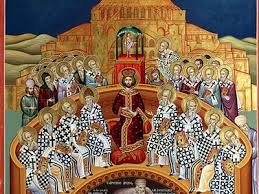
I believe in one holy, catholic, and apostolic Church! This statement has nothing to do with any denomination or sect. Rather, I am referring to the whole body of Christ, the people of GOD, the ‘Jesus movement’ (what a horrible term) as a whole, the full collection of the disciples of the Messiah.
That being said, how do we navigate the different understandings among us regarding what it means to be a Christian and what we consider to be sound Christian doctrine and beliefs? Christians disagree on so much: the realities of the sacraments, the structures of church governance, how the salvific will play out from the cross of Calvary, ways of describing the trinity, the description of Christ as both man and GOD, and the place of Scripture and tradition.
These are no small, trifling disagreements. In fact, they are weighty issues that directly impact what we do depending on the position we take on the topics. Despite this, I seek to hold in tension different denominations and groups as all being Christian; groups as disparate and opposed to one another as Reformed Calvinists and Roman Catholics or Oriental Orthodox and Eastern Orthodox Christians (really guys, could we not come up with terms that avoided just saying ‘eastern’ in two different languages). I firmly believe in bringing this ‘body of people’ back together, as close to full communion as possible.
I want to stress, it is not that I am ignorant of the differences between the miaphysitism and dyophysitism view, or between transubstantiation or consubstantiation. I understand the vast differences, yet I find that the unity of the Church is far more important than these differences. So – then, how do we navigate these many different truth claims?
Here are a few things worth considering:
- The truth is probably going to be so much more than we can grasp. The very limits of language and human perception, as well as clear teachings of the apostles, all but guarantee that while we are glimpsing the truth and apprehending it in a meaningful way, we are highly unlikely to be comprehending the truth in any absolute sense.
- Unity is a practical necessity, not an optional extra. Those who persecute Christians do not care about our differences and debates. Christian blood is being shed for the ‘perception of being Christian’ even if we disagree over who is really a Christian. Our unity is paramount as the persecution of one Christian group over there today will be the persecution of another Christian group over here tomorrow (and eventually it will be our’s). The unity of the Christian community is a clear command of our Lord, and His apostles. We must, as an act of discipleship, find a way to be of one heart and mind, so that we might be one.
- Any view of Christian history will remove from your imagination any illusion that our divisions are nothing but the products of fallen men trying to be faithful in a fallen world. Every Church looks like the conditioning of socio-economic and political realities.
- What unites us, as in the Lord Jesus Christ who is the Messiah, the Son of the Father(GOD), and our Saviour, is far more important than any of the issues that divide us.
- What is an error is not necessarily the same as heresy. A Christian can be honestly wrong about many things, yet still be a Christian. To fully articulate some of the doctrines of the faith and their nuances, we need a grasp on deep theology! Are we saying that only the ‘intellectuals’ can be truly Christian? No! Of course not! So, being free from error is not required to be a Christian. If you are wrong, you have to be sincerely wrong, and your error can not touch upon the true deity and humanity of Christ. I see things on a gradation from perfect, great, good, acceptable, minor error, grievous error, to heresy. A Christian can sit in grievous error (think prosperity gospel) and still be a Christian.
- I believe in a generous GOD who works with His people where ever and whenever they are to accomplish His purposes. Whether it is a medieval priest giving out absolution in the confessional in a back-water village in France or a global evangelical preacher doing an altar call at a stadium packed to the hilt with millennials, God is not limited by our limited perceptions of what He can do.
Let me try and show you the way I engage with these differences using some tangible examples, stating as I go along what my own position is while working it out ecumenically and highlighting some of the differences:
Seven Ecumenical Councils
Not all Christians accept that there were seven valid councils, but I do! I see the ecumenical councils as the last safe point on the journey of faith. You do not have to accept any of them as authoritative (reformed Christians accept none of them), but they are not a bad place to go to if you find yourself spiritually lost or struggling to work out your theology. So, whether you accept none, one, three, or all seven, the reality is, they are a useful point of reference that can keep you on the straight and narrow path. I want to stress that no council invented doctrine, they defined doctrine. Thus, you may try to define the same doctrine in other ways, though you might struggle to find a better way than these councils.
Sola Scriptura
I personally do not believe in it and most Christians around the world do not. However, since the Scriptures are a distillation of the teachings of the prophets and the apostles, a faithful-to-Scripture Christian is not going to go far wrong, if at all, in the matters of salvific importance. In my experience, all Sola Scriptura Christians are not, at least operationally, Sola Scriptura, even if they think they are. At most, their vaulting claims about Scripture do not mean they are not guided by the historical readings of those same Scriptures in reality.
The Sacraments
I believe that GOD can and does use the sacraments to administer grace. However, He can give the same graces without them. He is not limited because we think He is one way or the other. You can receive Christ’s forgiveness through a priest or baptism, and you can receive forgiveness without one or both positions. They are not mutually exclusive. GOD is not limited in operation because we are limited in perception or charity toward one another.
Ancient Apostolic Churches
The Ancient Apostolic Churches of Rome, Alexandria, Constantinople, Antioch, Jerusalem, and their governments. Should we not be in communion with them? I draw a line here between the apostolic faith and apostolic seats. These are ancient and venerable, continuous ‘churches.’ However, the faith they have in Christ can be had without being in communion with them. Let’s face it… the Popes of Rome in history are hardly said to be Christian. Similarly so, in the other seats. However, these ancient Churches are the real connection to the first apostles. So, while it is best to be in fellowship with an apostolic seat, it not necessary to one’s salvific faith; it just helps.
I hope these examples and the above considerations help you find a way in which you can be ecumenical in your own outlook and praxis of your faith, and find more space in your own heart for your brothers and sisters in Christ. I am not saying that ‘error’ does not exist or even that there is no actual truth. I am simply saying that the love of GOD covers a multitude of sins. Therefore, as much as we can, we should do the same.

